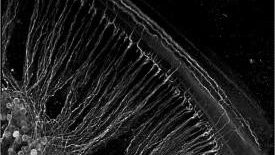
About us
Broadly, our aim is to translate discoveries about transmembrane receptor and ion channel signal transduction, into new platforms for treatment of neurological disorders. Our research program focuses on neuroprotection and repair in sensori-motor pathways. A principal area of research concerns the molecular and cellular basis of hearing loss (auditory neuroscience), where we investigate cell signalling that contributes to sensory hair cell and neuronal death due to noise and aging (including synaptic neuropathy). Study of neural development and synaptic plasticity in the auditory system informs on gene-targets for neural repair.
This research has an applied arm with respect to bionics such as the cochlear implant, and more broadly in developing neural interfaces with the brain. Within the brain, we are investigating neural plasticity associated with driven input (e.g. via the cochlear implant) and mechanisms for protection and repair of the nervous system (such as ischaemic brain injury, a model of stroke). Hearing loss is the most prominent sensory disability in our society. Stroke is the third highest killer and the most disabling for survivors. Our work is supported by national and international collaborations and funding.
Industry engagement
BaDGE® gene augmentation to improve the ‘Bionic Ear’: We are working to improve hearing and speech outcomes for cochlear implant recipients. underpinning the BaDGE® gene augmentation platform technology which is migrating to a first-in-human clinical trial to regenerate the cochlear nerve and ‘close the neural gap’ with cochlear implants. This work is supported by the CINGT program and includes co-investigators from the UNSW Biomedical Engineering Institute, the Bionics Institute (U. Melbourne), Dept. Otolaryngology U. Sydney, Sydney Cochlear Implant Centre, Macquarie University Hearing Hub and industry partner Cochlear Ltd.
ACTRN12618001556235
A phase I/II non-randomised, controlled trial, evaluating the safety and efficacy of neurotrophin gene therapy delivered during cochlear implant surgery
https://www.anzctr.org.au/Trial/Registration/TrialReview.aspx?ACTRN=12618001556235
Neuroprotection Research with Industry Partner Nyrada Inc.
The SMPT group is working with Nyrada Inc. to help develop new drugs that will reduce brain injury from stroke and trauma. This involves innovative brain injury models and proprietary GMO cell-based assays utilising genetically encoded Ca2+ reporters and membrane receptors.
Team
Current students
- Ms Lily Pearson (PhD)
Projects
Projects related to this group
- Bionic array-based gene electrotransfer (BaDGE®)
- Hearing protection conferred by P2X2 receptor signaling in the cochlea
- Physiological significance of transient receptor potential (TRPC3) ion channels in the cochlea
Collaborators
Collaborators related to this group
Prof. Allen Ryan (Univ. California, San Diego, USA); Prof. Peter Thorne, Dr. Srdjan Vlajkovic (University of Auckland, New Zealand), Prof. Jean-Pierre Julien (Laval University, Quebec, CAD), Prof. Lutz Birnbaumer (Buenos Aires, Argentina) Prof. Shin-ichi Usami (Shinshu Univ., Japan); Prof. Junichi Nabekura (National Institute of Physiological Sciences, Okazaki, Japan)
BaDGE® - CINGT collaborators: Scientia Prof. Nigel Lovell (UNSW); A/Prof. Matthias Klugmann (UNSW); Prof. Daniel Scherman and Dr. Corinne Marie (School of Pharmacy, Descartes, Paris), Prof. Anne Schielder (Otolarynology, UCL, London); Ya Lang Enke (Cochlear), Paul Carter (Cochlear), Jim Patrick (Cochlear), Saji Maruthurkkara (Cochlear), Lisa Nelson (UNSW), Catherine Birman (Sydney Cochlear Implant Centre), Colleen Psarros (Sydney Cochlear Implant Centre), Wai Kong Lai (Sydney Cochlear Implant Centre), Halit Sanli (Sydney Cochlear Implant Centre), Catherine McMohan (Macquarie University), David McAlpine (Macquarie University), Jaime Undurraga (Macquarie University), Fiona Odams (Macquarie University), Phillip Nakad (Macquarie University), Robert Shepherd (Bionics Institute), James Fallon (Bionics Institute), Andrew Wise (Bionics Institute).
Industry partners
Cochlear Ltd (Dr. Jim Patrick , Dr. Martin Svehla)
Roche Palo Alto (Dr. Deborah Cockayne)
Nyrada Inc.
Grants & funding
- The Garnett Passe and Rodney Williams Memorial Foundation grant-in-aid supplementation “A clinical trial on the safety of cochlear implant-derived neurotrophin gene delivery to improve the bionic ear“
- National Health & Medical Research Council (NHMRC - Australia) Development Grant APP1091646 Closing the neural gap in the bionic ear.
- Australian Research Council (ARC) Discovery Project DP151014754. Tuning molecular translocation by close-field electroporation.
- National Health & Medical Research Council (NHMRC - Australia) Project Grant APP1089838. Intrinsic hearing protection mechanisms: a pathway to prevention of noise-induced hearing loss.




